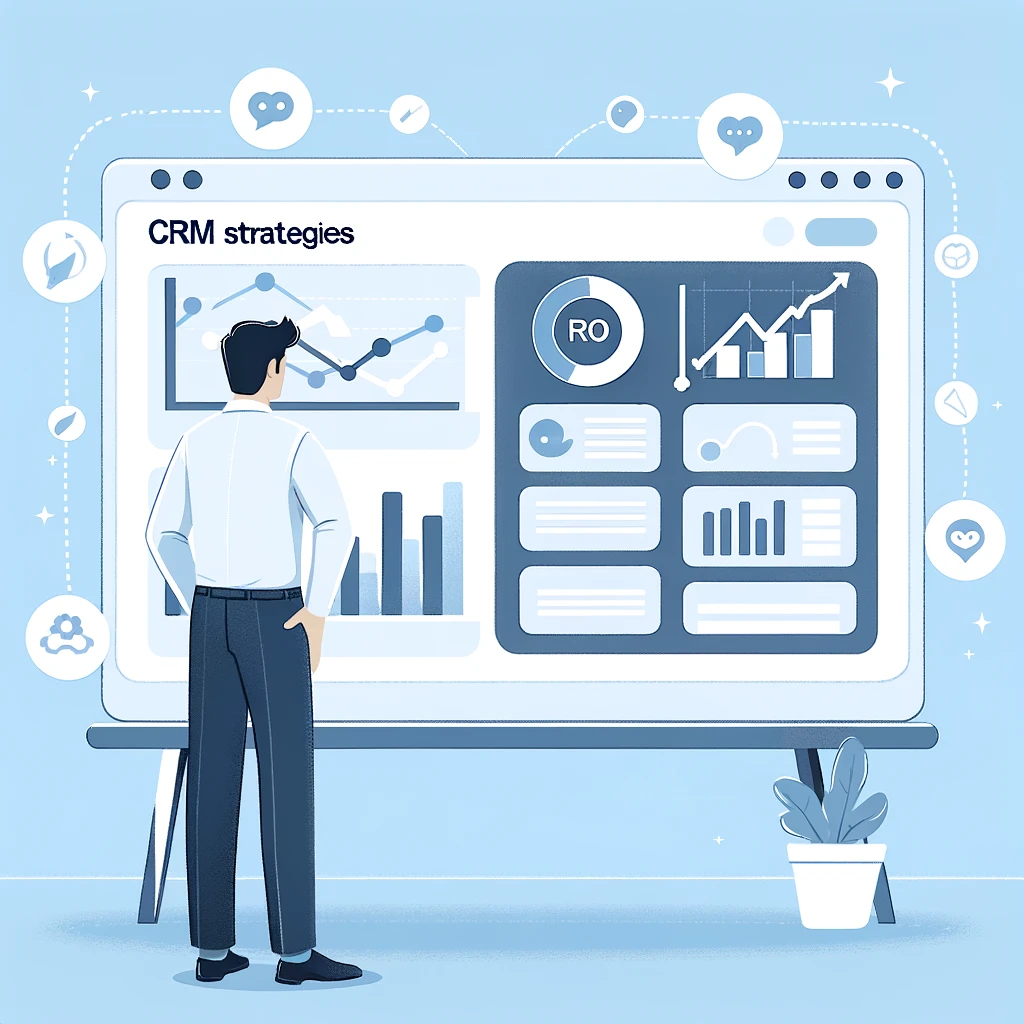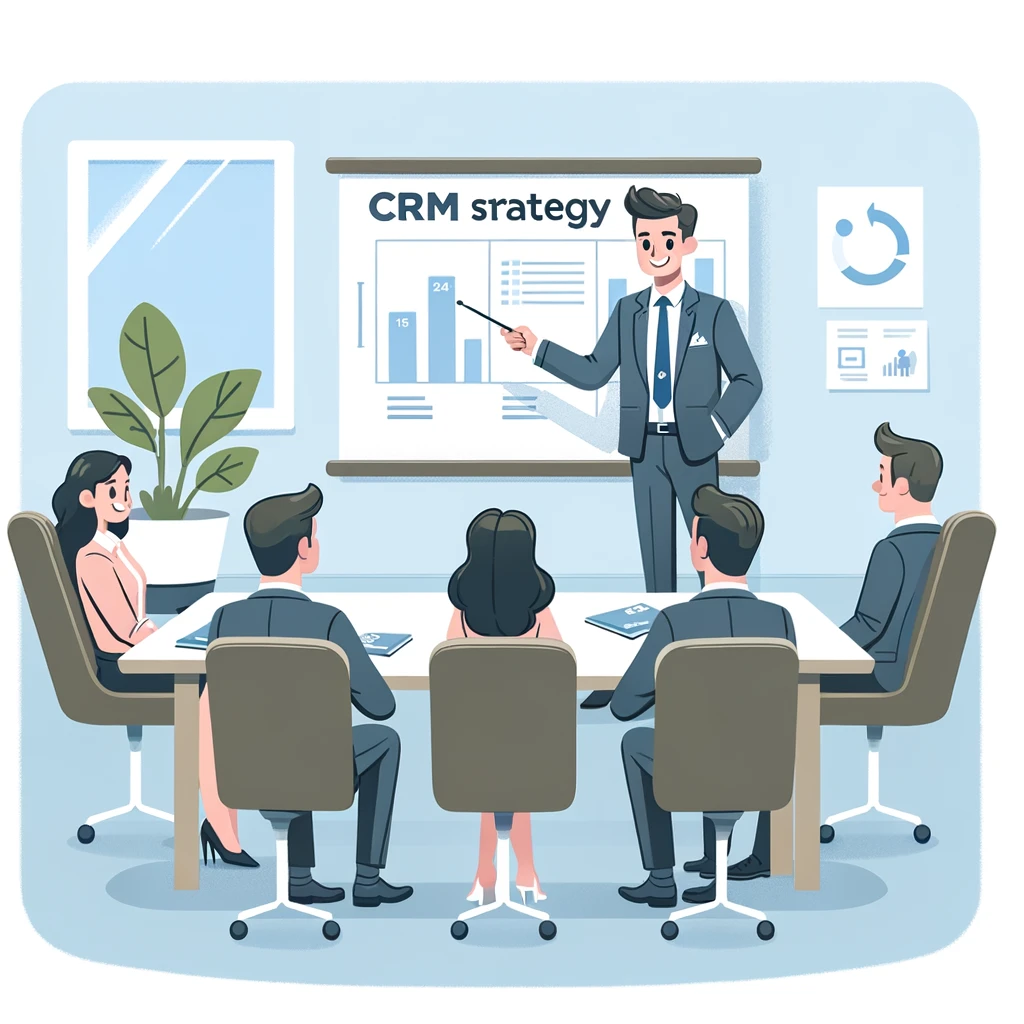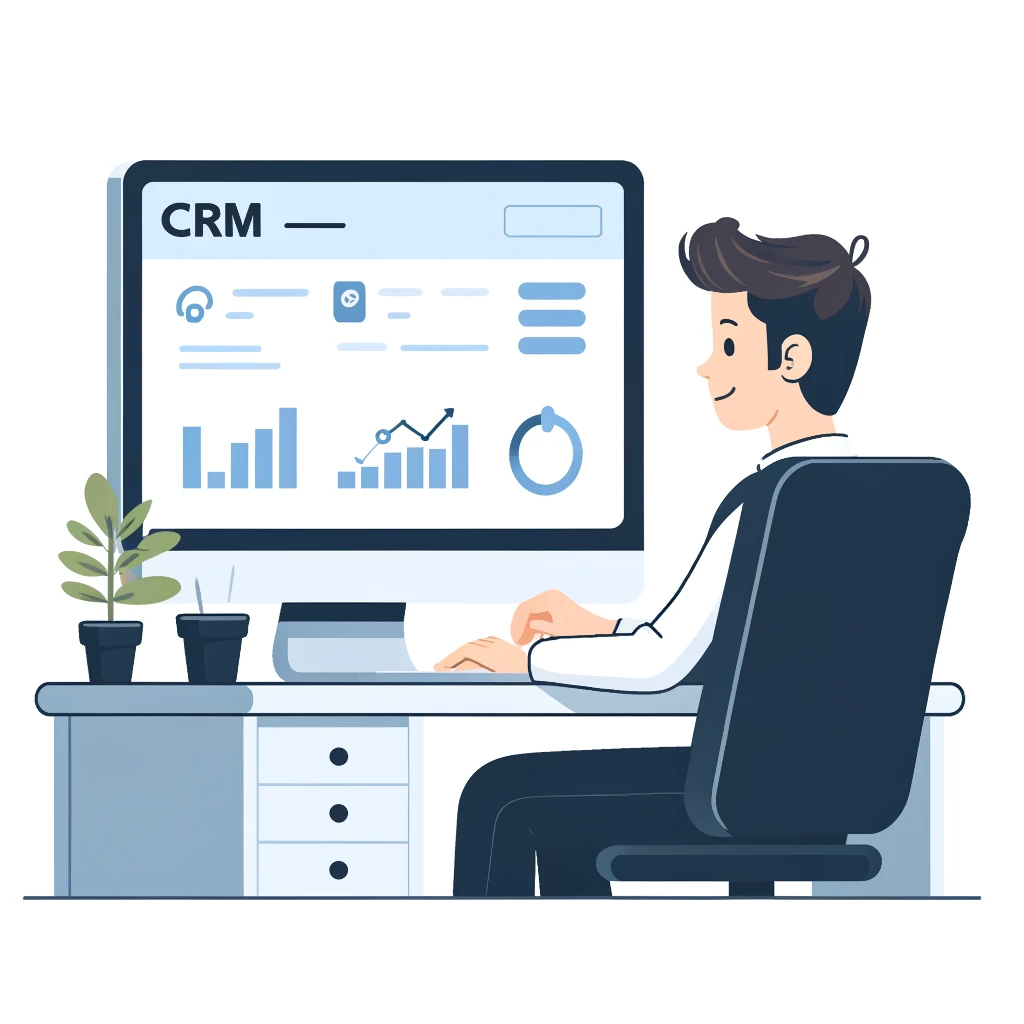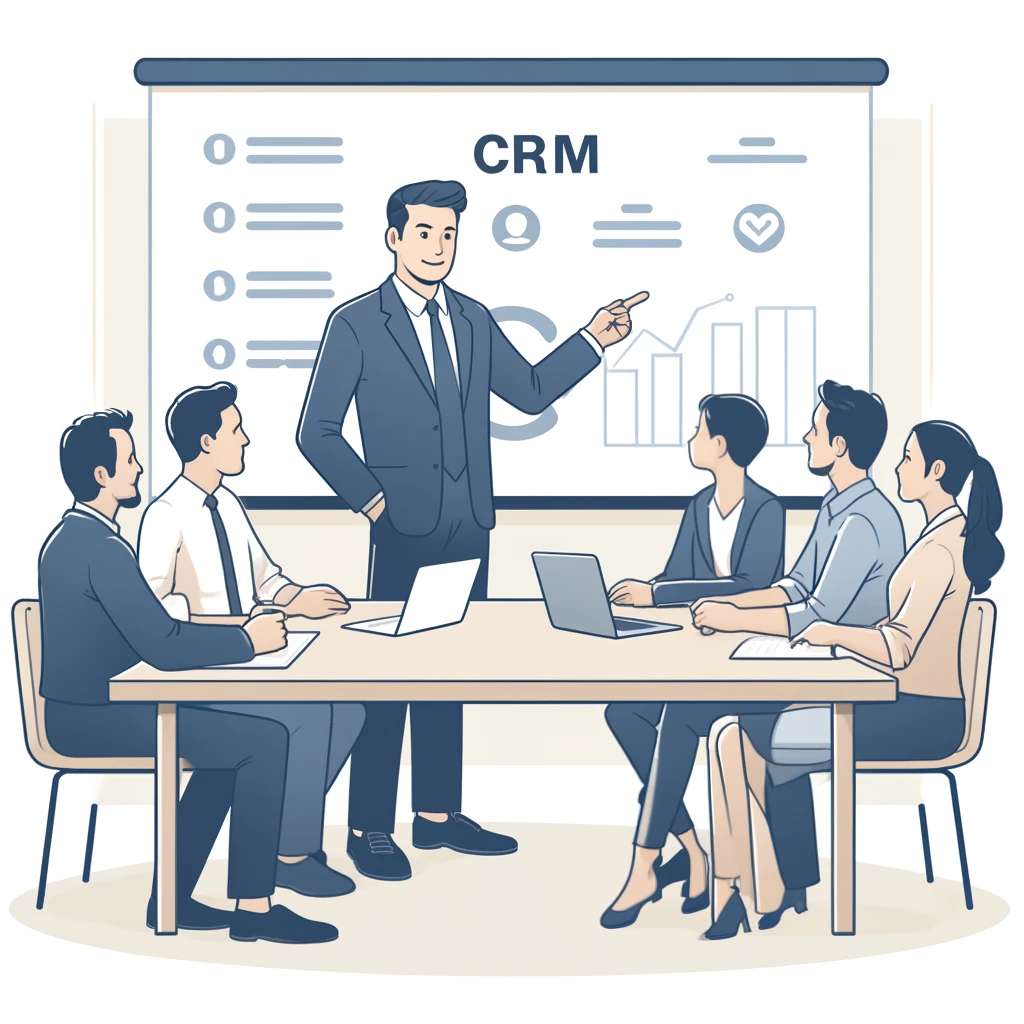What is CRM Manager: Role and Impact Explained

Uncover the main role of a CRM manager and how they drive customer relationship success for businesses.
Exploring the CRM Manager’s Role in Business Strategy
In the dynamic sphere of customer engagement, the CRM manager emerges as the architect of client satisfaction and loyalty. This pivotal role involves orchestrating CRM strategies that not only retain existing customers but also attract new ones through innovative acquisition tactics. A CRM manager harnesses data and analytical insights, shaping them into actionable strategies that enhance every customer touchpoint.
Unlike CRM analysts who dive deep into data to extract insights, CRM managers leverage this information to craft and oversee the execution of strategic plans. They ensure the CRM system serves as a robust foundation for an effective sales funnel, aligning marketing initiatives with customer acquisition objectives. By fostering synergy between sales and marketing teams, CRM managers optimize workflows for peak efficiency.

Their role is critical for nurturing a data-driven culture that champions customer loyalty. By keeping a finger on the pulse of market trends through diligent research, CRM managers enable businesses to respond swiftly to evolving customer needs. This agility is fundamental to maintaining a competitive edge in today’s market.
When considering hiring a CRM manager, businesses must weigh the benefits of bringing in seasoned expertise against the potential for internal growth. The ideal candidate will exhibit a blend of education, experience, and a suite of soft skills like leadership and communication, all vital for the role’s multifaceted demands.
In their toolbox, CRM managers should have access to a centralized CRM system like OZMA CRM, which streamlines data and automates critical processes. Additionally, task management tools and communication platforms are indispensable for orchestrating collaborative efforts across departments.
| Skill/Tool | Functionality | Impact on CRM Strategy |
|---|---|---|
| Data Analysis | Extract insights and trends | Informed decision-making |
| Communication | Coordinate with teams | Unified strategy execution |
| CRM Software | Centralize customer data | Efficient process automation |
| Market Research | Understand customer needs | Tailored marketing strategies |
As businesses navigate the complexities of customer relationship management, the role of a CRM manager cannot be overstated. They are the linchpin in a strategy that places the customer at the heart of all operations, driving satisfaction, and sustained business growth.
Unveiling the CRM Manager: A Strategic Business Leader
As the business world evolves, the CRM manager stands at the forefront, a strategic business leader whose expertise fuels the customer-centric engine of a company. This role is not just about managing a database; it’s about envisioning and applying comprehensive CRM strategies that bolster customer acquisition, engagement, and retention. The CRM manager’s ability to blend data-driven insights with creative solutions results in an enhanced customer journey and ultimately, a stronger bottom line.

While both CRM managers and analysts play crucial roles in understanding customer data, it’s the manager who takes the helm in strategic planning and execution. They ensure the CRM system operates not just as a repository of information but as a dynamic tool that supports an effective sales pipeline. By developing targeted marketing strategies and fostering collaboration across sales and marketing teams, they turn insights into action.
Key Responsibilities in Action:
- CRM System Mastery: Optimizing the CRM platform for maximum efficiency and impact.
- Strategic Marketing: Crafting campaigns that resonate with diverse customer segments.
- Team Coordination: Uniting different departments under common customer-centric goals.
The significance of a CRM manager’s role cannot be overstated—they are essential for securing customer loyalty and driving a data-informed approach to business strategy. When hiring for this position, it’s crucial to look for a candidate who not only has the technical know-how but also possesses strong leadership and communication skills. These attributes are the bedrock of a CRM manager who can not only navigate but also anticipate the needs of a dynamic customer landscape.
In their arsenal, CRM managers are equipped with tools that streamline operations and enhance collaboration. A system like OZMA centralizes customer data, providing a single source of truth that is accessible to all relevant teams. Project management tools keep initiatives on track, while communication platforms ensure that all stakeholders are aligned and informed.
| Tools & Skills | CRM Manager | CRM Analyst |
|---|---|---|
| Strategic Planning | ✓ | x |
| Data Analysis | ✓ | ✓ |
| Team Leadership | ✓ | x |
| System Management | ✓ | x |
| Communication | ✓ | x |
The CRM manager’s role is multifaceted and ever-evolving, requiring a keen eye for innovation and an unwavering commitment to the customer experience. As businesses continue to recognize the value of personalized customer interactions, the demand for skilled CRM managers will undoubtedly rise. It’s their strategic vision that can transform customer relationships into a sustainable competitive advantage.
Decoding the CRM Manager’s Impact on Customer Loyalty
At the core of every thriving business is a dedicated CRM manager, a catalyst for fostering enduring customer relationships and loyalty. Their role transcends traditional management; it’s a strategic endeavor that leverages both data and creativity to refine and personalize the customer experience. By implementing innovative CRM strategies, these managers play a pivotal role in shaping a customer’s journey with the brand, ensuring that every interaction adds value and strengthens the bond.

Customer Retention vs. Acquisition:
- Crafting loyalty programs that incentivize repeat business.
- Personalizing communication to make each customer feel valued.
- Analyzing customer feedback to drive continuous improvement.
CRM managers stand out from CRM analysts by their proactive approach to strategy and planning. Rather than simply interpreting data, they transform insights into robust retention tactics. Their efforts lead to a more nuanced understanding of customer needs, enabling businesses to deliver targeted solutions and messages that resonate on a personal level.
Enhancing Business Processes:
- Streamlining customer service protocols for efficiency and satisfaction.
- Integrating feedback mechanisms for real-time responsiveness.
- Employing CRM tools for a holistic view of customer interactions.
The importance of CRM managers lies in their ability to align business operations with customer expectations, thereby driving loyalty and, ultimately, revenue. Their strategies ensure that every department, from sales to support, uses the CRM system effectively, providing a seamless and satisfying customer experience.
When it comes to hiring a CRM manager, companies should prioritize a mix of strategic vision and operational expertise. The right candidate will possess a unique combination of analytical prowess and the ability to empathize with customer scenarios, thus steering the company towards a customer-centric culture.
Tools for Enhancing Customer Loyalty:
- Advanced CRM platforms for tracking customer behavior and preferences.
- Communication tools for timely and relevant customer outreach.
- Analytics software for gauging loyalty program effectiveness.
In conclusion, a CRM manager’s impact on customer loyalty is profound. They are the stewards of the customer’s voice within the company, ensuring that every strategy and tool is optimized to deliver memorable experiences that keep customers coming back.
| Customer Loyalty Factor | CRM Manager’s Influence |
|---|---|
| Satisfaction | Tailors CRM to exceed expectations |
| Trust | Ensures data security and privacy |
| Engagement | Develops targeted communication strategies |
| Feedback | Implements systems for prompt action on customer insights |
| Rewards | Creates incentive programs for repeat business |
By embracing the full spectrum of CRM capabilities, managers not only retain a loyal customer base but also transform satisfied customers into vocal advocates for the brand.
Navigating the Hiring Process for a CRM Leader
Embarking on the quest for a CRM leader requires a strategic approach, as this role is instrumental in sculpting the customer-centric framework of your business. The hiring process is a critical juncture where the decision between recruiting seasoned talent or nurturing an internal candidate can set the trajectory for your company’s CRM success.
When sourcing a CRM manager, it’s essential to identify candidates who not only possess the technical skills to manage and implement CRM strategies but also exhibit the creativity to develop customer acquisition and retention tactics. They must be adept at utilizing data to enhance business processes and possess a knack for transforming analytical insights into actionable strategies.
Qualifications to Consider:
- Education in business administration, marketing, or a related field.
- Proven experience in CRM strategy development and execution.
- Strong leadership capabilities to guide cross-functional teams.
- Excellent communication skills for effective team and client interactions.
- A thorough understanding of data analysis and market research methodologies.
A CRM manager’s impact on your business is profound, as they are the driving force behind data-driven customer loyalty and satisfaction. They ensure that your CRM system is not merely a database but a dynamic tool that nurtures customer relationships and supports an effective sales funnel.

In the digital age, the tools at a CRM manager’s disposal are pivotal. A robust CRM system like OZMA CRM is imperative for centralizing data and automating processes, while task management tools help organize projects efficiently. Communication platforms facilitate seamless collaboration, ensuring the strategic vision is clearly disseminated and executed across departments.
| Qualification | Importance | Why It Matters |
|---|---|---|
| CRM Expertise | High | Central to managing and optimizing customer relationships |
| Strategic Vision | Essential | Guides long-term CRM strategy and customer engagement |
| Leadership | Crucial | Fosters team unity and drives the execution of CRM initiatives |
As you navigate the hiring process, prioritize candidates who demonstrate a balance of analytical acumen and the ability to foster genuine connections with both customers and team members. The right CRM leader will not only resonate with your company’s vision but will also be the catalyst for its growth and success in the realm of customer relationship management.
Remember, the goal is to hire a CRM manager who will be a strategic business partner, steering your customer engagement efforts towards new heights and contributing significantly to the overarching goals of your organization.
In closing, the recruitment of a CRM manager is not merely filling a role; it’s investing in the future of your customer relations and, by extension, your company’s prosperity. Choose wisely, for the right individual will be at the heart of your CRM strategy, driving both customer satisfaction and business growth.
Essential Tools for the Modern CRM Manager
In the quest to master customer relationships, the modern CRM manager’s arsenal is incomplete without cutting-edge tools that drive efficiency and foster collaboration. At the center of this technological suite is a powerful CRM system, such as OZMA CRM, which serves as the nexus for data centralization and automation, ensuring that every customer interaction is tracked and leveraged to the fullest.
Advanced CRM Systems:
- Centralize customer data for a 360-degree view
- Automate routine tasks to free up time for strategic work
- Provide analytical capabilities to decode customer behavior
Task management tools are another cornerstone for CRM managers, enabling them to orchestrate projects with precision and clarity. These tools help break down complex strategies into manageable tasks, streamlining the path from planning to execution. Communication platforms, meanwhile, ensure seamless dialogue within teams and with clients, keeping everyone aligned with the overarching customer-centric goals.
Collaboration and Efficiency:
- Task management tools keep projects on track and teams accountable
- Communication platforms facilitate real-time updates and feedback
A CRM manager thrives on the synergy between strategy and technology, using every tool at their disposal to enhance customer acquisition and retention. By leveraging these sophisticated resources, they can turn insights into action, crafting personalized experiences that resonate with customers and drive loyalty.

In conclusion, the essential tools for a CRM manager are not just about managing data—they’re about creating a dynamic ecosystem where strategy, creativity, and technology intersect to deliver unparalleled customer experiences. With these tools, CRM managers are well-equipped to navigate the complexities of today’s market and lead their businesses to new heights of customer engagement.
| Tool Type | Purpose | Benefit to CRM |
|---|---|---|
| CRM System | Centralize and automate customer data | Enhances decision-making and customer insight |
| Task Management Software | Organize and prioritize projects | Increases team productivity and efficiency |
| Communication Platforms | Facilitate team collaboration and alignment | Ensures cohesive execution of CRM strategies |
By integrating these essential tools, CRM managers can not only meet but exceed the evolving demands of customer relationship management, solidifying their role as strategic business leaders within their organizations.
FAQs
What does a CRM Manager do?
A CRM Manager oversees customer relationship management strategies, analyzing customer interactions to improve business relationships.
Why is a CRM Manager important for businesses?
CRM Managers are crucial for ensuring customer satisfaction, loyalty, and driving sales through personalized relationship strategies.
What skills are essential for a CRM Manager?
Key skills include data analysis, strategic planning, communication, and proficiency with CRM software.
How does a CRM Manager contribute to sales growth?
By managing customer data and tailoring experiences, CRM Managers help increase customer retention and acquisition.
Can small businesses benefit from a CRM Manager?
Absolutely, small businesses can see significant growth by effectively managing customer relationships through a CRM Manager.
Read more about low-code platform ozma.io
CRM for Beginners: Easy to Start!
CRM for Photographers: More Clients and Efficiency





